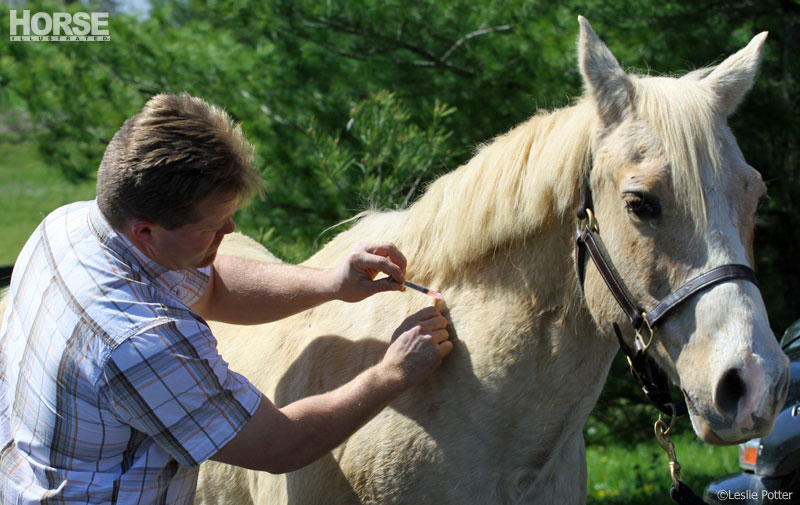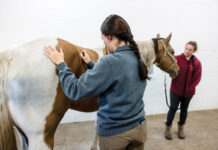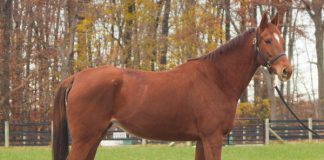Vaccinating your horse against disease is such a simple task. It’s not terribly time consuming, and it’s relatively inexpensive when you consider the alternative. But some people don’t vaccinate. Lack of concern regarding disease risk, and skepticism about vaccine safety and efficacy are among the reasons given.

A Case for Safety
There is an extensive amount of time, money and resources involved in the research and development of a vaccine. Generally speaking, it takes three to four years of time and millions of dollars spent before a vaccine gets licensing from the U.S. Department of Agriculture(if it ever does).
“I have never had anyone explain to me scientifically why you would not vaccinate a horse,” says Tom Lenz, DVM, vice president, Professional and Technical Services, Zoetis. “Occasionally, you may have a horse that reacts to a vaccine systemically—has an anaphylactic reaction [a severe and rapid allergic reaction that requires immediate veterinary attention], or hives, or you may have a horse that has a local injection site reaction, but those are fairly rare.”
Dr. Lenz feels the risk of disease is just too high if you don’t vaccinate. “If your horse develops tetanus, the odds of him dying are about 99 percent. The fatality rate for West Nile virus, based on statistics over the last three years, is at least 30 to 40 percent. The fatality rate for rabies is 100 percent.”
“I think it’s important that horse owners recognize that licensed vaccines go through extensive purity, safety and efficacy testing prior to being released for sale,” says D. Craig Barnett, DVM, senior equine technical services specialist of veterinary services at Intervet Inc. “Every serial [batch] of vaccine has to pass certain standardized potency and safety tests.” Dr. Barnett says that the vaccine production process is “extensive, complex, scientific and judicious.”
Vaccine Efficacy
Even if you trust the safety and efficacy standards, and you follow a strict vaccination schedule for your horse, he may not be protected against disease.
“Vaccination does not equal immunization,” Dr. Barnett says. “A horse has to mount an immunological response—produce antibodies or other immune responses to the vaccine—following vaccination. This response will vary depending upon the vaccine used and the horse’s own immunity. Not all horses will mount an immune response to vaccination—approximately 10 percent don’t—and those that do respond differently,” he says. “Some respond well, some middle of the road, some poorly.” A horse’s general health plays a large role in this factor. Stressed horses, malnourished horses or those that are otherwise unhealthy may not mount a good immunological response to vaccination.
A horse’s age is also critical to vaccine efficacy. In most situations, vaccinations for healthy foals from vaccinated mares, for example, shouldn’t be given until the youngster is at least 3 months of age. Some veterinarians prefer to wait even longer. Foals that receive adequate colostrum from their properly vaccinated dams (vaccinated four to six weeks prior to foaling) should have sufficient immunity from the diseases the mare is immunized against. Vaccinating these foals too soon may possibly compromise their natural ability to fight disease.
Efficacy is also dependent on when you vaccinate. Dr. Barnett recommends vaccinating while your horse is healthy and before potential disease exposure or high-risk periods (before going to shows, trail rides, parades, et cetera). “We need to consider that there is a lag time between vaccination and development of an immune response.” Lag time, along with the fact that disease can compromise a horse’s immune system, is why many veterinarians recommend not vaccinating for certain diseases in the face of an outbreak.
Vaccination is only an aid in prevention of infectious disease, and won’t succeed without appropriate management practices. Dr. Barnett explains that you have to reduce your horse’s exposure to disease by following basic horsekeeping practices:
- Avoid contact with sick horses.
- Quarantine new incoming horses. Without a quarantine system, there is a very serious threat for bringing in infectious disease to an established herd or group of horses.
- Avoid contact with outside horses—on trail rides, horse shows, et cetera.
- Avoid using universal waterers or feed sources.
- Reduce or eliminate stress, because it has a negative effecton the immune system.
- Vaccinate all horses in a herd or on a farm on the same schedule whenever possible.
“As horse owners, we must take responsibility for the management part of infectious disease control,” Dr. Barnett says.
America’s Healthy Horse
Even though the vaccine manufacturing process is filled with quality control measures to help ensure safe vaccines, it’s important for horse owners to recognize that vaccines are foreign substances, and that adverse reactions may occur. This is a good reason why it’s best to let your veterinarian vaccinate—he or she has the knowledge and the appropriate medications to treat an allergic reaction should it occur. During vaccination your veterinarian can examine your horse, which is part of a good disease prevention strategy.
The American Association of Equine Practitioners (AAEP) recommends that horses be seen by a veterinarian twice a year for wellness exams to address vaccination, parasite control, nutrition and dentistry. 2006 saw the launch of the “America’s Healthy Horse” initiative, a joint effort between the AAEP and Fort Dodge Animal Health that encourages regular wellness exams for horses.
Vaccination Protocols
What are the most important points horse owners should consider regarding their vaccination strategies? “It’s very important to realize that ‘one size does not fit all’ when it comes to vaccination protocols and schedules,” Dr. Barnett says. “Universal vaccination recommendations are impossible to make.” They vary depending upon many factors, including age of horse, incidence of disease in the area, geographic location, number of horses on the premises, exposure to other horses, use of the horse (broodmare, show horse, et cetera).
Vaccination programs should be tailored to each individual horse and farm. Dr. Barnett says horse owners should assess the need to vaccinate for each disease based on:
- Risk—What risk does this disease pose to the horse? Keep in mind that disease risk can vary between types of horses—pleasure horses, broodmares, foals, performance horses.
- Consequences of the disease—Is the disease life threatening? What is the mortality rate? Is there potential for human exposure (as with rabies)?
- Efficacy of the vaccine and the potential for adverse reactions to vaccination.
Most veterinarians agree that even if the risk of a particular disease is moderate to low, but the consequence of the disease is deadly, you should vaccinate as long as the vaccine is safe and efficacious. However, if the risk of a disease is moderate to low, the disease mortality rate is low, and the vaccine for it has marginal efficacy and safety, then you probably won’t vaccinate unless risk increases.
“I think every horse ought to be vaccinated against tetanus, Eastern equine encephalomyelitis, Western equine encephalomyelitis, West Nile virus and rabies,” Dr. Lenz says. Most veterinarians agree with this opinion. “Whether or not horses receive rhino [equine herpes virus], flu, strangles, Potomac horse fever or some of the other vaccines, depends on the part of the country they live in and what their veterinarians think,” Dr. Lenz continues.
You also have to consider vaccination frequency. “In some parts of the country you may give rhino and flu once a year, in some areas it’s more frequently,” Dr. Lenz says. “West Nile virus—we used to vaccinate once a year, now the general consensus is to vaccinate spring and fall. In some areas, like the South, you may need to vaccinate against it even more frequently. So it depends on the exposure rate.”
Dr. Barnett says many horses are undervaccinated, but some are overvaccinated. Robert Holland, DVM, Ph.D., agrees. As a practicing veterinarian in Lexington, Ky., and a senior technical service veterinarian with Pfizer Animal Health, Equine Division, he says, “If you are giving a flu/rhino vaccine every two months, you’re possibly overvaccinating. Sometimes we think more is better, but sometimes it’s better to let the horse’s immune system wax and wane, so when you give the vaccine you get a much better response.”
All the experts agree that your veterinarian is the best source of information when designing and implementing a vaccination program best suited to the needs of your horse. Your vet is familiar with the risk of disease in your area, risk of disease to your farm and/or individual horses on that farm, knows the consequences of diseases, and is familiar with the efficacy and safety of different vaccines.
Further Reading
What to Expect When Vaccinating
Horse Vaccination Chart
This article originally appeared in the March 2006 issue of Horse Illustrated. Click here to subscribe.







Recommended vaccination schedules would be useful
should a small pony be vaccibated with the same amount as a large horse:300# vs 2100#?
do you think it is possible that you could list the sites of where to give a itramuscular an intravenous and a subcutaneous injection? it would be appreciated if there where. thanks
Thanks for the article!
This is a GREAT article and I agree with it 100 %.
I am in a dilema as one of my Appaloosa mares that we raised from birth, is now 12 and has been vaccinated since 6 months old now is having reactions to her vaccinations. We are puzzled to what one – 2007 she received EWTF, Rabies, PHF and West Nile, had a very bad reaction like she was colicing after about 4 hours after the vaccines. In 2008 we started out with giving her the PHF, Rabies and West Nile, within 15 minutes she was showing signs of “itching” and acting very uncomfortable so she was given a vaccine of benedryl and seemed OK. About 4 hours later, she was down and out, got her up and walked, walked and walked, banamine was given and she was AOK by next AM. This year, 2009 we started out with a benedryl vaccine, 15 minutes later gave her a rabies vaccine and she seemed fine. 4 hours later she was down for the count again, Vet returned, all vitals checked, banamine administered and she was AOK by next AM. Vet said no more vaccines for her !!! Does any one know why this could be happening all of the sudden and going without the vaccines is asking for trouble in my opinion. Please help, thank you. Sue Stearns
I have a 10 yr old QH who started reacting to vaccinations by colicking and severe hives all over his body. He has also been diagnosed with Type 1 PSSM. He is on the recommended diet and exercise. He was given the 3-way vaccine and was a mess with hives, almost closed his airway. What should I do? The intensity of hives has increased tenfold over last year. HELP
man, i’m doing this FFA thing and i need to find certain stuff, and i’m just not finding it! i’m gonna fail dawg…this is not good. man. anyone got a b**r?
i got my toes in the water a** in the sand not a worry in the world cold beer in my hand life is good today dddaaawwwgggyyy
One of my colts ended up with a “huge” bump on his neck that stayed all summer long.
Wow! Sounds bad! Thanks Horse Channel for all of this! It really helps! 🙂
The vets in this article work for Pfizer and Fort Dodge. I wonder why they highly recommend vaccines? hmmmmmm?
Thanks
Thanks, good to read a second time. 🙂
Thank you.
Thanks!
It’s good to go over this information, just before the shot season this spring.
Good information! Definitely will pass it on to friends
My horses alway had yearly shots, this year I can not afford them, being nearly 300 dollars for the ten doses. People do not get yearly shots, and my vet said it would be OK, to skip, a year because they should have immunity built up.